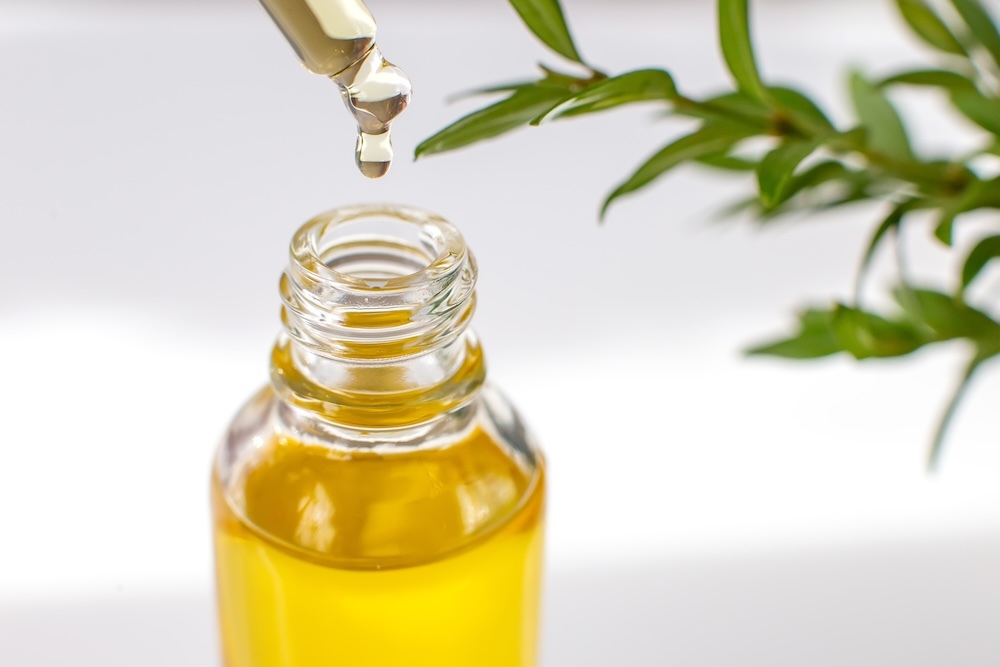Tea tree oil—derived from the leaves of Melaleuca alternifolia, an Australian native—has earned a reputation as a botanical powerhouse. With its antimicrobial, anti-inflammatory, and antioxidant properties, it’s a popular ingredient in natural skincare, hair care, and home remedies. This guide dives deep into its benefits, safe use, and sustainability to help you harness its power effectively and responsibly.
What Is Tea Tree Oil?
Tea tree oil is a steam-distilled essential oil extracted from the leaves of M. alternifolia, primarily grown in Australia. Its therapeutic properties stem from chemical compounds—especially terpinen‑4‑ol (35–48%), α-terpinene, and 1,8-cineole—which support its antimicrobial and anti-inflammatory effects.
Key Benefits & Uses
1. Acne-Fighting Properties
Tea tree oil is effective against mild to moderate acne due to its ability to decrease inflammation and fight acne-causing bacteria. Clinical trials with 5% tea tree oil gel showed significant reductions in inflammatory lesions and overall acne severity compared to placebos. While slower-acting than benzoyl peroxide, it often causes fewer side effects.
2. Antimicrobial & Anti-Inflammatory Power
Tea tree oil displays significant antibacterial, antifungal, and anti-inflammatory activity. Research shows benefits for minor cuts, insect bites, athlete’s foot, dandruff, and fungal skin infections. It also helps disinfect surfaces when used in homemade cleaners.
3. Scalp & Dandruff Relief
Adding just 5% tea tree oil to shampoo has been linked to reduced dandruff, itchiness, and flakiness.
4. Nail & Athlete’s Foot Treatment
Tea tree oil has shown improvements in athlete’s foot symptoms with topical use, though some users reported mild dermatitis.
5. Oral Health
Mouthwash containing 0.2%–0.5% tea tree oil has shown promise in reducing dental plaque and gingival inflammation.
6. Multi-Use Household Aid
Tea tree oil’s antiseptic nature makes it useful in natural cleaners, producing safer, plant-based disinfectants for home use.
How to Use Tea Tree Oil Safely
Diluted Topical Application
- For acne: dilute 5% oil in a carrier (e.g., 1 drop in 19 drops of jojoba) and apply twice daily
- For fungal skin issues: start with a 5–10% concentration
- For nail infections: higher concentrations like 25–50% may help—but patch test first
Shampoo Routine
Add a few drops (about 1%) to your regular shampoo to address dandruff.
Oral Care
Mix 1–2 drops in water for a natural mouthwash—swish carefully, do not swallow.
Home Cleaning
A simple recipe: 20 drops tea tree oil + ½ cup vinegar in a spray bottle makes a biodegradable surface disinfectant.
Safety & Sensitivity Tips
- Always dilute; never apply pure oil directly. Essential oils are potent and can cause irritation.
- Patch test new blends—stop use if irritation, redness, or rash occurs.
- Avoid use on children under 6 or during pregnancy without professional guidance.
- Never ingest—tea tree oil can be toxic if swallowed, causing neurological and gastric symptoms.
- Use within 12 months, store in amber-glass bottles away from heat and light.
Sustainability & Quality Considerations
- Seek ISO-certified, 100% pure tea tree oil to ensure terpinen‑4‑ol concentration.
- Prioritize organically grown or ethically wild-harvested sources, ideally from small-scale Australian farms that follow best practices.
FAQs
Can tea tree oil completely replace over-the-counter acne treatments?
It can be effective for mild to moderate acne but is slower and less potent than benzoyl peroxide. It is best used as a complementary or alternative treatment.
How quickly should I see results?
Most users notice improvements in 6–12 weeks of consistent use.
Will it clog pores?
No—tea tree oil is non-comedogenic, so it doesn’t block pores.
Can tea tree oil cause allergic reactions?
Yes—about 5–15% of users experience contact dermatitis, especially at higher concentrations or with oxidized oils.
Is it safe on scalp and for dandruff?
Yes—5% tea tree in shampoo has shown significant improvement in dandruff symptoms.
Final Thoughts: Nature’s Portable Remedy
Tea tree oil remains a versatile and powerful natural remedy—ideal for those seeking eco-friendly, plant-based solutions. From acne to fungal issues, oral care, and home disinfection, its benefits are well-supported when used responsibly. Prioritize diluted application, patch testing, sustainable sourcing, and storage care to ensure safety and effectiveness.
Let tea tree oil become a staple in your sustainable lifestyle toolkit—naturally fresh, intentionally sourced, and thoughtfully used.








